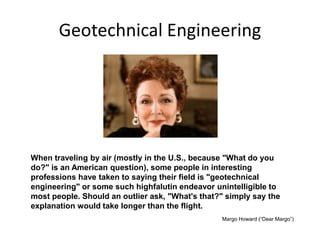The Best Guide To Geotheta
The Best Guide To Geotheta
Blog Article
3 Easy Facts About Geotheta Described
Table of ContentsThe Ultimate Guide To Geotheta10 Easy Facts About Geotheta DescribedThe smart Trick of Geotheta That Nobody is Talking AboutGeotheta - TruthsThe 10-Second Trick For Geotheta

They carry out website investigations, accumulate samples, do lab examinations, and evaluate information to assess the suitability of the ground for construction jobs - Geotechnical Engineers. Based on their findings, geotechnical engineers provide referrals for structure layout, incline security, keeping structures, and mitigation of geotechnical dangers. They team up with various other professionals, such as designers, structural designers, and construction teams, to make sure that geotechnical considerations are incorporated into the general job layout and execution
By evaluating the habits and residential properties of dirt and rock, they can determine possible geotechnical threats such as landslides, dirt negotiation, or incline instability. Their experience aids prevent failures or crashes that could endanger lives and residential property. Below are some comprehensive responsibilities and obligations of a geotechnical engineer: Site Examination: Geotechnical designers conduct site examinations to collect data on subsurface problems.
They translate the data to recognize the buildings and actions of the dirt and rock, including their stamina, leaks in the structure, compaction features, and groundwater problems. Geotechnical Evaluation and Style: Geotechnical engineers analyze the data accumulated throughout website investigations to analyze the stability and suitability of the site for building and construction tasks. They execute geotechnical estimations and modeling to review elements such as birthing ability, negotiation, slope stability, lateral earth stress, and groundwater circulation.
All about Geotheta
Foundation Design: Geotechnical designers play a vital role in designing foundations that can securely sustain the designated framework. They analyze the dirt conditions and load needs to figure out the suitable foundation kind, such as shallow structures (e.g., footings), deep structures (e.g (https://slides.com/geotheta)., piles), or specialized techniques like soil enhancement. They take into consideration factors such as settlement restrictions, birthing capability, and soil-structure interaction to develop optimal foundation layouts
They review construction strategies, screen site activities, and perform field evaluations to confirm that the design recommendations are followed. If unpredicted geotechnical concerns develop, they evaluate the situation and supply suggestions for remediation or modifications to the layout. Risk Analysis and Mitigation: Geotechnical designers assess geotechnical threats and dangers connected with the task site, such as landslides, liquefaction, or soil erosion.

Collaboration and Communication: Geotechnical engineers function carefully with other professionals associated with a task, such as designers, architectural engineers, and construction groups. Reliable interaction and partnership are important to integrate geotechnical considerations right into the total project style and building procedure. Geotechnical engineers provide technological competence, answer questions, and guarantee that geotechnical needs are satisfied.
Geotheta Can Be Fun For Everyone
Here are some kinds of geotechnical designers: Foundation Designer: Foundation engineers focus on designing and analyzing foundations for structures. They analyze the soil conditions, tons requirements, and site features to establish the most proper structure kind and layout, such as shallow structures, deep structures, or specialized methods like stack structures.
They review the aspects affecting incline security, such as dirt buildings, groundwater conditions, and slope geometry, and develop approaches to stop incline failings and reduce dangers. Quake Designer: Quake designers specialize in examining and designing structures to withstand seismic forces. They analyze the seismic threat of a website, evaluate soil liquefaction potential, and create seismic layout standards to guarantee the safety and resilience of structures during earthquakes.
They do area testing, collect examples, and evaluate the accumulated information to define the soil residential properties, geologic formations, and groundwater conditions at a site. Geotechnical Instrumentation Engineer: Geotechnical instrumentation designers concentrate on surveillance and gauging the actions of soil, rock, and frameworks. They set up and maintain instrumentation systems that keep an eye on variables such as dirt settlement, groundwater degrees, slope movements, and structural variations to analyze efficiency and offer very early cautions of possible problems.
Not known Facts About Geotheta
They perform tests such as triaxial examinations, consolidation examinations, direct shear tests, and permeability examinations to gather data for geotechnical evaluation and design. Geosynthetics Engineer: Geosynthetics engineers specialize in the layout and application of geosynthetic materials, such as geotextiles, geogrids, and geomembranes. They use these materials to enhance soil stability, enhance slopes, give drainage options, and control disintegration.
They tend to be investigative individuals, which implies they're intellectual, reflective, and investigative. They are curious, methodical, logical, analytical, and logical. Some of them are also social, suggesting they're kind, generous, cooperative, individual, caring, valuable, compassionate, skillful, and friendly - Geo Tech Engineer.
In the workplace atmosphere, geotechnical engineers make use of specialized software devices to do estimations, develop styles, and examine data. They prepare records, review job requirements, interact with customers and group participants, and coordinate job activities. The office setup supplies a favorable environment for study, evaluation, and partnership with other specialists entailed in the job.
How Geotheta can Save You Time, Stress, and Money.
They frequently see job sites to perform site investigations, evaluate geotechnical problems, and gather data for evaluation. These check outs entail traveling to different places, occasionally in remote or tough surfaces. Geotechnical engineers might carry out dirt sampling, conduct examinations, and monitor building and construction activities to make certain that the geotechnical aspects of the task are being carried out appropriately.
Geotechnical engineers also function in specialized geotechnical research laboratories. Geotechnical lab designers function thoroughly in these settings, dealing with screening equipment, operating instruments, and taping information.
Report this page